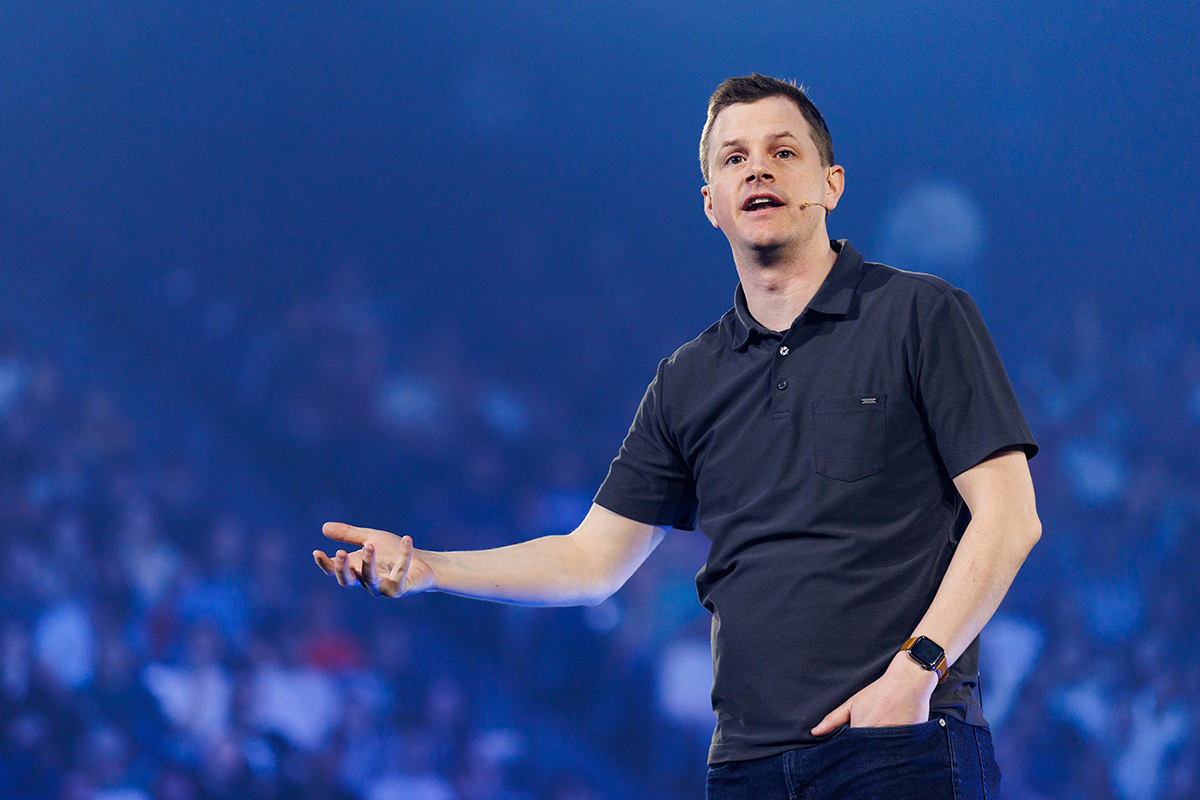Search News Archives
Filter News Articles
Additional Navigation
Gabe Lyons offers critical review of artificial intelligence and biblical truth
September 22, 2023 : By - Office of Communications & Public Engagement

Liberty University Chancellor Jonathan Falwell welcomed alumnus Gabe Lyons (’97), bestselling author and founder of THINQ media, to the Convocation stage Friday morning, where he addressed how humanity is being affected by artificial intelligence and how Christians should respond to the new technology.
“I believe Christians ought to be the most thoughtful, the most informed, and the most educated on every single question that our culture is asking,” Lyons said. “We have a responsibility do to that because the Scriptures and the Church (body of Christ) throughout history have always had the best answers to what human beings face … to the questions your generation is asking.”
He said the goal of artificial intelligence is to form a singular language so that nothing becomes impossible for man. He referenced Genesis 11, explaining that humans have a desire to lift themselves up rather than submit to God — a temptation as old as time.
While AI is used to leverage computers to mimic the problem-solving and decision-making capabilities of the human mind, in beneficial forms like navigation apps and virtual assistants, he said there’s also a danger in losing dependency on human knowledge.
“What is the thing that artificial intelligence wants from you? … it wants you to stop thinking.”
Lyons also warned against the adoring of technology, as it inhibits people from processing information well and forces them to rely on something artificial instead of thinking for themselves.
“You’re not doing the work that it takes to learn, that it takes for you to cultivate in your own mind these thoughts,” Lyons said.
He then went on to explain that in a relationship, there are expectations which allow you to understand where things are going in the future, and if you look at where AI is heading, “it’s after your biology.”
“You see, AI wants to know your biology … it wants your heart rate and your sleep patterns,” Lyons said. “It wants to know every piece of information that you’d be willing to permit it to have, and many of us just do this somewhat mindlessly. We see one of the benefits, and out of convenience, sometimes we give up our privacy. That will always be a temptation with AI to be aware of.”
Lyons believes it is helpful for humans to be engaged in order to know how to respond to these temptations. We should evaluate our past interactions with AI, like social media influence. According to Lyons, AI promised many positives such as increased productivity, the capacity to influence the masses, and the ability to connect with friends and family members. But he invited Liberty students to also reflect on the consequences of AI such as mental health issues, information overload, and addiction.
“In China, they’ve actually rolled out a way where AI is being used to track the opinions, the thoughts, the ideas, the bank accounts of the human beings in China in some sections where they’re testing this. And what’s taking place is every human being is given a score based on their opinions and how much their opinions align with government’s opinions.”
“This is how it could go horribly wrong,” Lyons continued. He further elaborated on the “wrongness” by talking about the dishonestly of AI and how it doesn’t have a consistent worldview.
“As a Christian, you need to have a consistent worldview,” Lyons said. “You need to know what you believe about who you are as a human being and why we’re here and how we ultimately get redemption through the cross, through Christ, through his resurrection. We have to take that truth into the world, and AI will compete with that truth.”
Lyons was reminded of Paul’s warning in 2 Timothy 3:7 that says we can get to a point of learning but never come to a knowledge of truth. He challenged students to point their friends toward the truth of the Scriptures which truly bring eternal life, because it is through Christ that we overcome the problem of evil.
“This is the defining question for the Christian: ‘Am I becoming more or less human because of AI?’”
Lyons concluded by saying that information is everywhere, but the Church (body of Christ) seeks biblical wisdom.

“I want to encourage you to push yourself … take the time to think, pause, and consider. … Continue to pursue the creative talent and genius that God has built into you, that the world longs for, and at that
point, AI just might help you become more human.”
Prior to Lyons’ speech, Grammy Award nominee and recording artist Tauren Wells opened Convocation by reading from Psalm 20. He encouraged students to grow closer to God to “see God do what He is famous for in your life.”
Liberty President Dondi Costin then welcomed the many families at Convocation who are visiting campus for the first College For A Weekend (CFAW) of the academic year before Wells led the crowd in worship alongside the Liberty Worship Collective. Wells is set to perform in a special CFAW concert at the Vines Center at 8 p.m. tonight.


